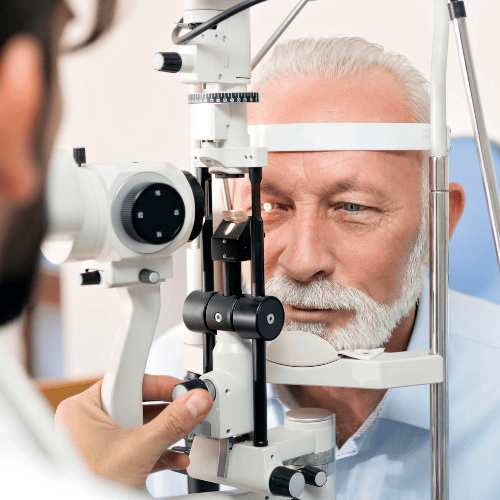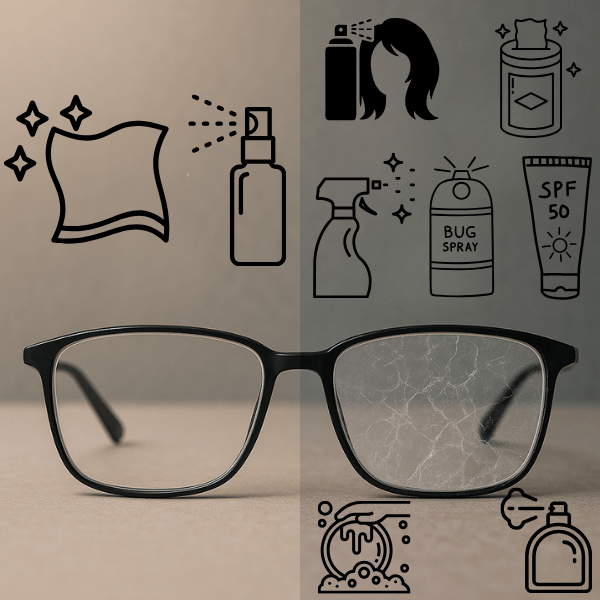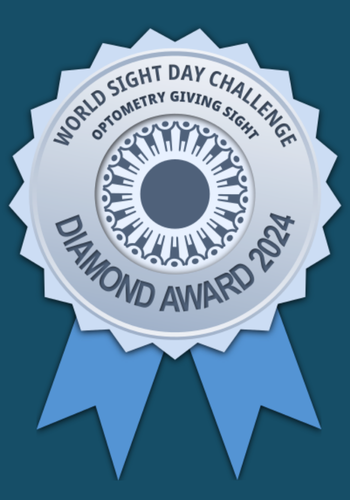Dietary Nutrition and AMD
Age-related macular degeneration (AMD) is an eye disease associated with aging that affects the macula, the part of the retina responsible for providing fine detail, central vision. Dry AMD is the most common form of the disease and is typically characterized by a gradual blurring of central vision. Wet AMD is the more advanced form of the disease and is typically associated with new blood vessel growth underneath the macula that can cause sudden and drastic changes in central vision. AMD is the leading cause of vision loss in Canada and is the leading cause of blindness in patients over the age of 65. All patients are advised to maintain a healthy lifestyle, exercise regularly, eat a diet high in fruits and green leafy vegetables, avoid smoking, maintain adequate blood pressure control, and protect their eyes from UV sunlight in order to decrease their risk of developing macular degeneration . Studies have shown that nutrition plays a large part in reducing the risk for developing advanced macular degeneration.
The Age-Related Eye Disease Study (AREDS) is a clinical study that was sponsored by the National Eye Institute; the results were released in 2001. The purpose of the study was to determine if antioxidants and/or zinc provided any protective effect against the development of age-related macular degeneration (AMD). Taking the AREDS formulation reduced the rate of advanced AMD in people at high risk by about 25% over a 6 year period. It is important to note that there was no proven benefit in taking the formulation for patients with either no signs or very early signs of macular degeneration.
The specific daily amounts of each nutrient and mineral studied in the AREDS study are as follows:
1. 500 mg vitamin C. Vitamin C is an antioxidant also known as ascorbic acid. The human body does not make vitamin C naturally, so we rely on external sources to get it. Studies have shown that it can help to prevent retinal damage as well as cataracts and cardiovascular disease. Dietary sources of vitamin C include yellow sweet peppers, citrus fruits, brussel sprouts, kiwi, strawberries, and cantaloupe. While there is little risk in taking high doses of vitamin C, some patients may experience diarrhea.
2. 400 IU vitamin E. Vitamin E is a powerful antioxidant that helps to maintain a healthy circulatory system and plays a significant role in the function of the immune system. Good dietary sources include sunflower seeds, oils, asparagus, green leafy vegetables, fortified grain products, wheat germ, almonds, and other mixed nuts. Because vitamin E is fat-soluble, it can have significant side effects if taken in excess (such as increased risk of bleeding or hemorrhaging, especially for patients already taking blood thinners). The National Eye Institute has deemed 400 IU vitamin E per day to be a safe dose, but patients should always consult with their medical doctor before starting higher doses of vitamin E, especially if they take blood thinners or have a history of heart disease.
3. 15 mg beta-carotene (equivalent to 25,000 IU vitamin A). Beta-carotene is a carotenoid and is a precursor of vitamin A which helps to prevent dry eye, cataract, and retinal disease. Carotenoids are what gives natural pigmentation to many of the foods that contain it (including apricots, cantaloupe, carrots, spinach, sweet potatoes, and chili peppers); they also serve as a filter for ultraviolet light and protect the retina from UV radiation and oxygen. We depend on external sources to get carotenoids because the body does not make them. High doses of beta-carotene can cause reversible yellowing of the skin and are associated with an increased risk of lung cancer. Patients who smoke are typically prescribed an AREDS formulation that does not contain beta-carotene. Many optometrists and ophthalmologists also recommend that macular degeneration patients take 6-12 mg per day of another carotenoid called lutein.
4. 80 mg zinc (zinc oxide). Zinc is a trace element that is known to boost the immune system and is also an antioxidant. It has been shown to reduce the progression of AMD both on its own and in combination with other antioxidants. Zinc is found in high-protein food sources such as beef, lamb, pork, peanut butter, and legumes. Taken at higher doses, it has been associated with gastrointestinal upset and urinary tract infections. Studies are underway to determine if lower doses of zinc can reduce patient symptoms of GI upset while still reducing risk of progression to advanced AMD.
5. 2 mg copper (cupric oxide). Copper was added to the AREDS formulation because higher doses of zinc are associated with copper deficiency. Copper deficiency can lead to anemia.
In addition to the above formulation, new research is currently under way to determine the benefits of other oral supplements. The AREDS II study began in the fall of 2008, and the results of the study are expected in 2013. Researchers are looking to determine the effect of oral supplementation of the carotenoids lutein and zeaxanthin (pigments that are found in the macula) as well as that of omega-3 fatty acids (DHA and EPA) on the progression of advanced AMD. Early evidence has shown that they are beneficial in decreasing the risk of progression of AMD, and many practitioners are recommending supplementation of these nutrients to their patients with macular degeneration. AREDS 2 will also determine if reduced doses of zinc (due to increased risk of urinary tract infection and stomach upset) and/or no beta-carotene (due to increased risk of lung cancer in smokers) works as well as the original AREDS formulation in reducing the risk of progression of AMD.
Before taking these high levels of vitamins and minerals, you should talk with your eye doctor about the risk of developing advanced AMD and whether taking the AREDS formulation is right for you. It is also recommended that patients consult with their medical doctor prior to starting supplementation due to the potential for side effects associated with taking higher doses of some of these vitamins.
Mountain View Optometry
Cochrane, AB











